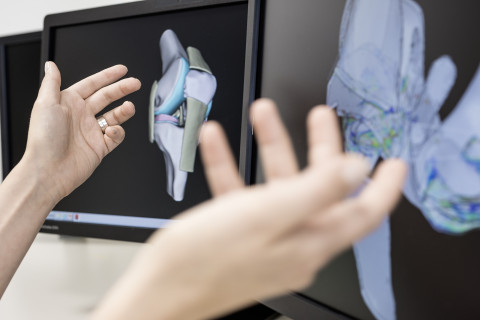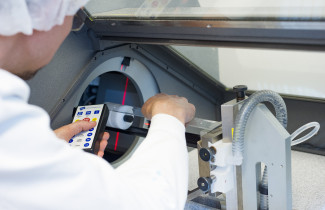MSc Ville-Veikko Wettenhovi studied the image reconstruction of fMRI and PET in his doctoral thesis. The results showed that the state estimation methods, especially the data driven method for covariance estimation, are feasible methods for the image reconstruction of fMRI data.
The role of functional imaging is growing in clinical practice, where it is used to investigate the functional and physiological changes in the target. Unlike anatomical imaging, functional imaging is used to determine the function of an area or an organ of interest rather than the structure. Several different functional imaging techniques exist with functional magnetic resonance imaging (fMRI) and positron emission tomography (PET) being two widely used methods. For accurate diagnosis, it is important to obtain images with good spatial and, for time-varying examination, temporal resolution. Due to this, optimal image reconstruction is required.
In this thesis, the image reconstruction of fMRI and PET was studied. In fMRI, blood oxygenation level dependent (BOLD) and dynamic contrast enhanced (DCE) MRI data were used. For fMRI both measured and simulated data were utilized, while for DCE-MRI only experimental data were utilized. The goal was to improve the spatial and temporal accuracy of BOLD and DCE-MRI image reconstruction with the use of state estimation methods. The state estimation methods used in this thesis were based on Kalman filter (KF). For PET image reconstruction, a new open-source software called open-source MATLAB emission tomography software (OMEGA) was developed for MATLAB and GNU Octave. Evaluation of the OMEGA software was conducted by using both experimental preclinical PET data and simulated GATE Monte Carlo data.
For the state estimation in fMRI, two different approaches were utilized. The first used spatial regularization to improve the spatial resolution of the KF estimates. These regularization methods were an augmented version of the KF augmenting the measurement domain, total variation denoised KF and another augmented Kalman filter utilizing a spatial prior in the image domain. The second approach used a data driven model for the computation of the process and observation noise covariances in the KF framework. In the data driven approach the standard sliding window estimates were used to obtain an estimate for the covariances. Additionally, the covariances were further optimized with the use of KF consistency tests. Furthermore, Kalman smoother (KS) estimates, using the Rauch-Tung-Striebel fixed-interval smoothing, were computed along with the KF estimates in all cases. For the data driven case, the steady-state KS was used.
For PET image reconstruction, the OMEGA software was developed. The aim of OMEGA was the easy reconstruction from both simulated and experimentally measured PET data. OMEGA includes several built-in maximum likelihood and maximum a posteriori algorithms along with several different priors. Three different ray-tracing projectors are available for both 1D and 3D line-of-response (LOR) modeling. The reconstruction procedure is available matrix-free with both a pure parallel central processing unit (CPU) implementation as well as parallel graphics processing unit (GPU) implementation utilizing the open standard OpenCL. Furthermore, to enable efficient development of new algorithms, a special MATLAB/Octave class exists that allows efficient computation of the forward and backward projection operators in the PET framework.
The results of this thesis showed that the state estimation methods, especially the data driven method for covariance estimation, are feasible methods for the image reconstruction of fMRI data. Both the regularized and the data driven methods improved the spatial and temporal accuracy when compared with the sliding window method. Furthermore, it was shown that the golden angle sampling method for radial MRI is superior in the KF framework compared to the traditionally used linear sampling. In addition to the state estimation in fMRI, this thesis showed that the reconstruction results of the software OMEGA has comparable quality to that of the vendor provided software in the Siemens Inveon PET and provides fast reconstruction capabilities for 3D PET data.
The doctoral dissertation of MSc Ville-Veikko Wettenhovi, entitled Image reconstruction in functional MRI and PET will be examined at the Faculty of Science and Forestry on the 23rd of June at 12 noon Kuopio Campus and online. The opponent in the public examination will be Associate Professor Simo Särkkä, Aalto University, and the custos will be Professor Marko Vauhkonen, University of Eastern Finland. The public examination will be held in Finnish.



